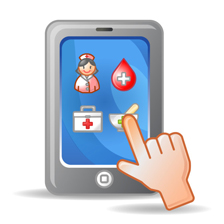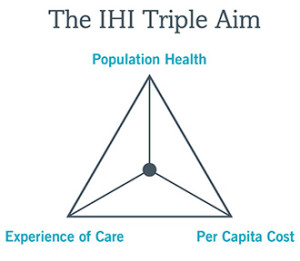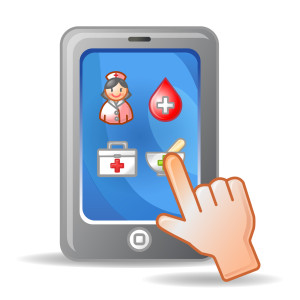
Support for mobile health (mHealth) as a larger component in the U.S. healthcare practice is alive and growing. Twenty-four percent of physicians currently report using mHealth technologies, and half of that group use them daily, according to a 2014 survey of U.S. physicians by Deloitte.
MHealth offers great opportunity to improve the patient experience. Closer monitoring of patient conditions. Better assistance managing patient medication regimens. Less time spent in hospitals. Fewer delays in patient-related communications. The most notable benefit of mHealth is the ability it gives physicians and other providers the opportunity to partner with patients as active agents on their personal health journeys and co-create care.
Co-creation of Care to Improve the “Triple Aim”
 The co-creation of care is an increasingly important component of modern healthcare. At its highest level, it includes patients and all professionals working together to influence the process and results of healthcare. Co-creation contributes to achieving success in each area of the triple aim. It gives providers the means to impact population health, it can improve overall quality and patient experience, in addition to driving down costs related to readmissions. MHealth is one enabler of co-creation.
The co-creation of care is an increasingly important component of modern healthcare. At its highest level, it includes patients and all professionals working together to influence the process and results of healthcare. Co-creation contributes to achieving success in each area of the triple aim. It gives providers the means to impact population health, it can improve overall quality and patient experience, in addition to driving down costs related to readmissions. MHealth is one enabler of co-creation.
So, how are healthcare professionals using mHealth technologies now, and how do they hope to incorporate them in the future? The possibilities are as diverse as their applications.
Empower Patients as Health Seekers
Patients should no longer be idle listeners. We are living during an era of “patient ascendency” when patient engagement and activation are becoming even more critical to successful treatment. Mobile web resources available with the click of a button or swipe of a screen have opened a vast frontier of information to patients. Embrace it. According to Peter Jones, author of Design for Care, patients seek information to serve one of two purposes: To restore or maintain their health.
The right technology can help them do both, and doctors can further guide patients in their health information seeking journey. If your organization offers a mobile app or web portal easily accessible from a mobile phone, walk them through its functionality at the end of the visit. Show them how to view test results and where they can explore information that adds increased depth to conversations during the visit. According to HIMSS Analytics, 69 percent of clinicians are already using mobile devices to access patient information including laboratory results. Encourage patients to do the same.
Encourage Patients to Document Concerns between Visits
Robert Wachter, author of The Digital Doctor envisions a future where each patient has their own care coordinator to support them during visits, distill test results and connect the dots between advice given from separate practitioners and specialists. Until that vision becomes a reality, if it ever does, recommend that patients keep a list of concerns or note changes in their overall well-being via a mobile app. The iOS and Android app, My Doc Notes, was created to capture patient questions in one central hub. That way during an appointment, patients can reference a pre-populated list. Especially during an already elevated situation, notes can decrease stress for patients recalling sensitive information or concerns during the visit.
Provide Continuing Care, Reduce Healthcare Waste
Seventy-two percent of healthcare professionals feel mHealth will motivate patients to take more responsibility for their care, according to Research Now. Considering the creativity of mobile care options being piloted, mHealth also offers the potential to reduce healthcare waste. The U.S. collectively spends over $26.6 billion per year on physical therapy. This high cost has inspired providers and wellness companies to craft creative solutions that maximize patient value for less.
At San Mateo Center in California, professionals are testing a virtual avatar program to assist patients with physical therapy following knee replacement surgery.
Another company RespondWell has created a telerehab program allowing patients to heal at home. They recently announced a partnership with Redmond, Washington-based Sensoria to incorporate input from a wearable technology device into the virtual therapy system. The goals? Improving patient success through accurate data collection while decreasing costs by minimized in-person visits.
According to research by Deloitte, this type of innovation interests physicians most. Three times as many seek mHealth solutions that offer clinical value compared to simplifying monitoring patients’ biometrics.
Offer Health Coaching via mHealth
Innovators like MOBĒ, offering chronic care management through mHealth, along with Sensei, a system of portals and apps designed to connect members with their insurance carriers, have embraced the potential for wellness coaching through mobile technology. Six out of ten consumers are interested in managing and monitoring their health issues this way. Recommend that patients seek out mHealth coaching services as a means of preventative health and continued motivation between office visits.
The Road to mHealth Adoption
The path to even greater mHealth adoption won’t necessarily be an easy one. Some have concerns about the security and privacy of mHealth platforms. Others require access to mHealth technologies in the work environment to fully leverage the potential. One thing is certain, the more meaningful connections that exist between patients and physicians, the easier communication, collaboration and knowledge transfer will become.





